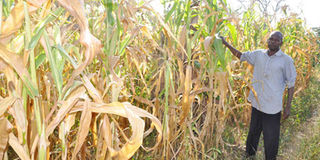Scientists predict a hotter Uganda

Impact. Mr John Basiibye, a farmer in Wakiso District, shows his maize which dried up following a dry spell in 2017. PHOTO BY JOSEPH KIGGUNDU
What you need to know:
- Last year, a UN Intergovernmental Panel on Climate Change (IPCC) warned that should countries fail to stick to the demands in the Paris Agreement of keeping global temperatures below 1.5°C in the next 12 years, then the world is doomed.
Kampala. Scientists have predicted that Uganda may experience the worst temperature raise in history, which will have far-reaching consequences on the economy.
Dr Joab Osumba, a researcher at Consultative Group on International Agricultural Research (CGIAR), said their ongoing study points to an increase in temperature of 2.5 to 3.5 degrees in Uganda by 2050.
“From our climate modelling, there is a likelihood of more dry days over most parts of the country by 2050,” Dr Osumba said.
“In both [planting] seasons, we may experience temperatures of 2.5 degrees to 3.5 degrees,” he added.
Dr Osumba was speaking last week at a Climate Smart Agriculture East Africa Project workshop in Mbale Town organised by SNV, a Netherlands organisation, Wageningen University and Research (WUR) and Climate Change Agriculture and Food Security (CCAFS) programme.
“We should do agriculture extension differently; plant according to the 2019 climate, invest in adaptation and climate-oriented insurance,” he said.
Acknowledged
Dr Mary Goretti Kitutu, the State minister for Environment, separately said she believes in the research findings and attributed the increasing temperatures to destruction of carbon sinks.
“We [Uganda] do not emit a lot of carbon dioxides but we have destroyed our carbon sinks [forests and wetlands],” Dr Kitutu said.
“If this temperature increases, it means we will not be able to grow crops [especially coffee],” she added. Mr Teferi Demissie, a climate scientist, said any increase in temperatures would be disastrous for the country.
“Any increase in temperatures, it means Uganda will be hotter than what we are experiencing,” Mr Demissie said at the same workshop attended by soybean farmers and value chain traders from Elgon, greater Bukedi and Busoga sub-regions.
Ms Florence Gibutayi, a soybean farmer, who attended the conference, said if government and other stakeholders do not address the climate change tissue, they will be out of farming business.
“Majority of the farmers cannot access improved seeds, which are expensive, or technologies such as irrigation. We need support,” Ms Gibutayi said.
World leaders warned
Last year, a UN Intergovernmental Panel on Climate Change (IPCC) warned that should countries fail to stick to the demands in the Paris Agreement of keeping global temperatures below 1.5°C in the next 12 years, then the world is doomed. The Paris Agreement, which Uganda has ratified, was reached at during the UN climate conference (COP21) in France in 2015, with signatories committing to reduce emissions and keep annual global temperature rise below 2 degrees centigrade. The rising temperatures, which have resulted in climate change, scientists say, are a result of burning fossil fuels that emit gases such as carbon dioxide and methane into the atmosphere. Also, cutting down of forests and wetlands are other causes of rising temperatures. According to the 2009 National Environmental Management Authority (Nema) report, Uganda had more than five million hectares of forest cover in 1990. But by 2005, only 3.5 million hectares (8.6 million acres) remained.



